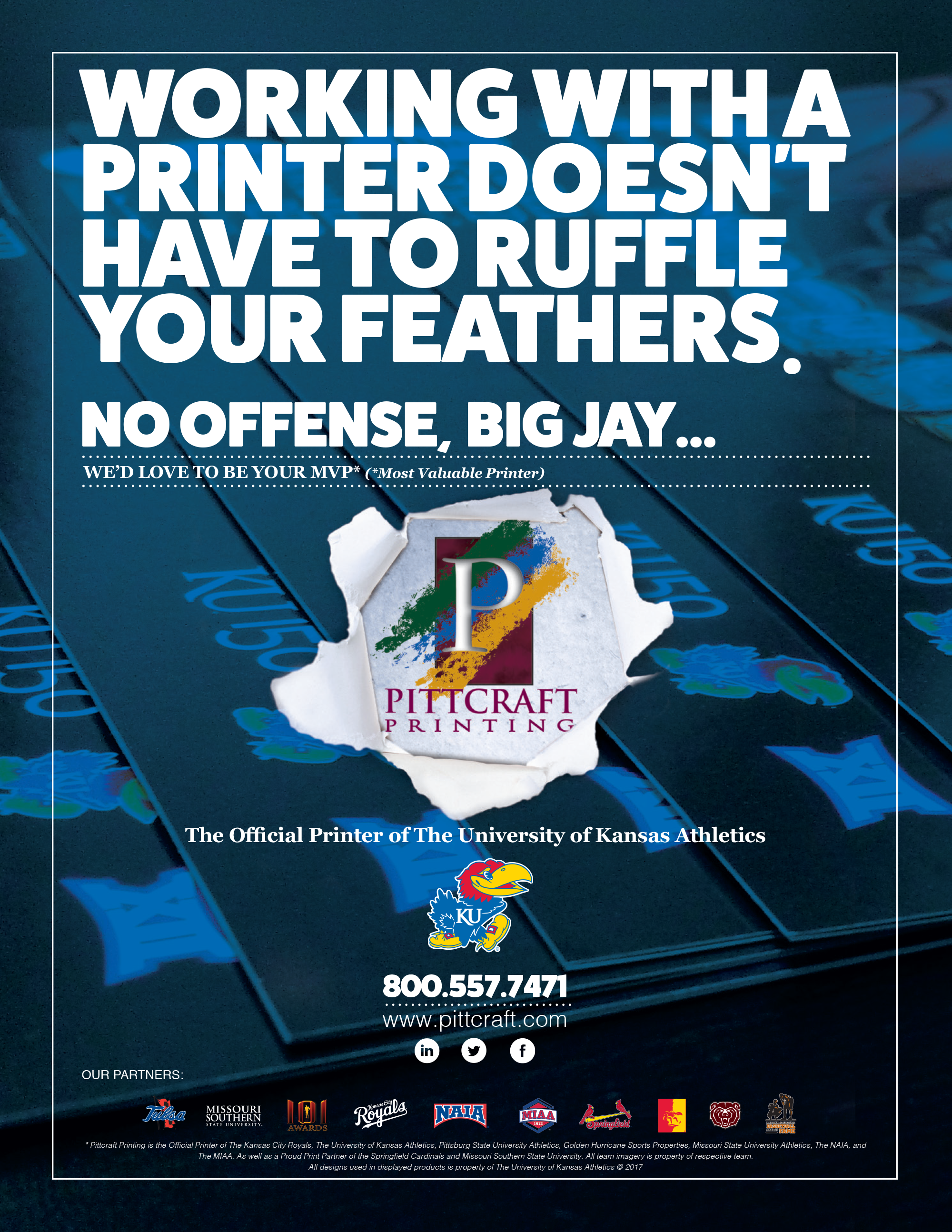RCW: Once a Jayhawk, Always a Jayhawk: Tracy Bunge
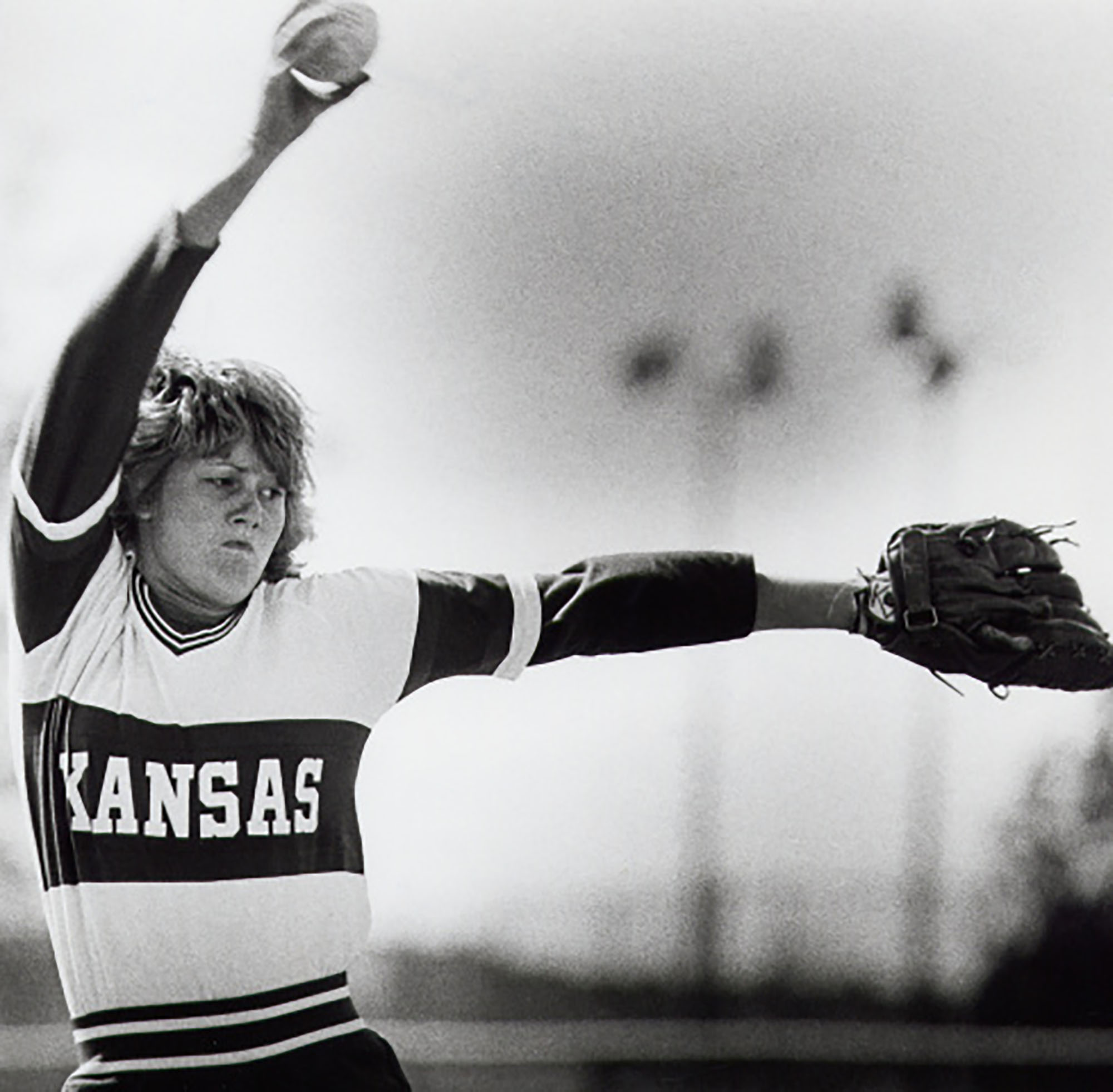
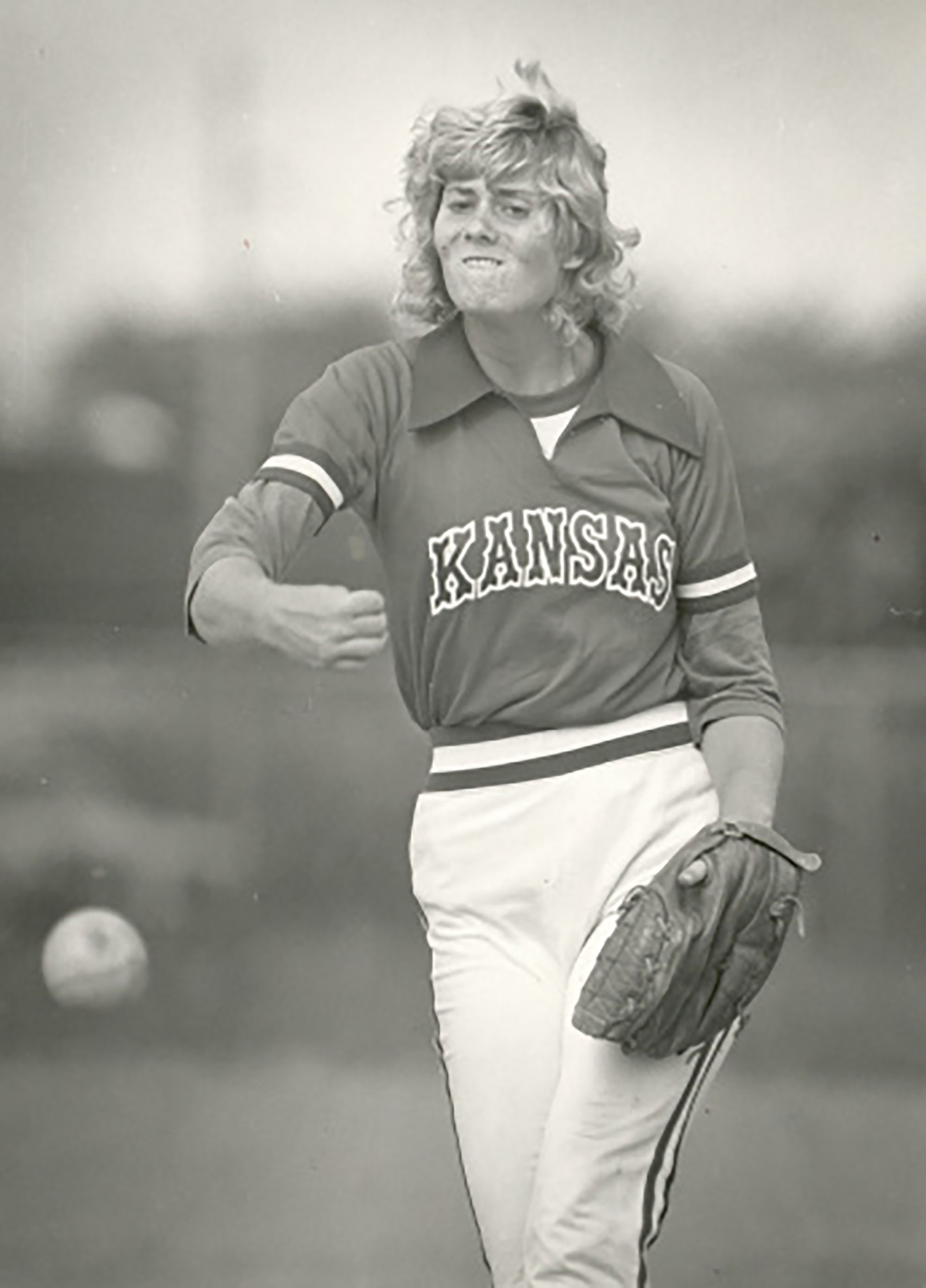
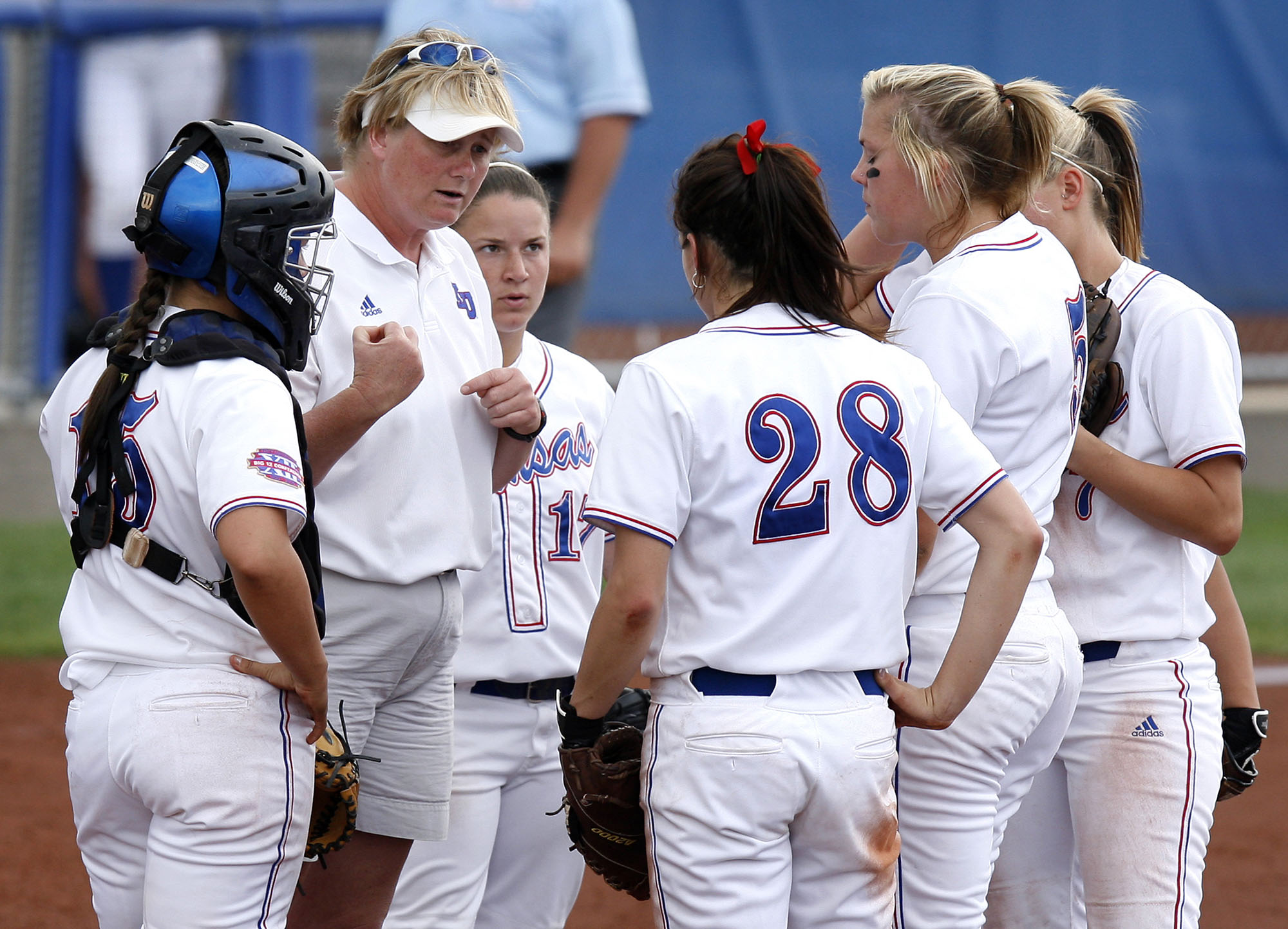
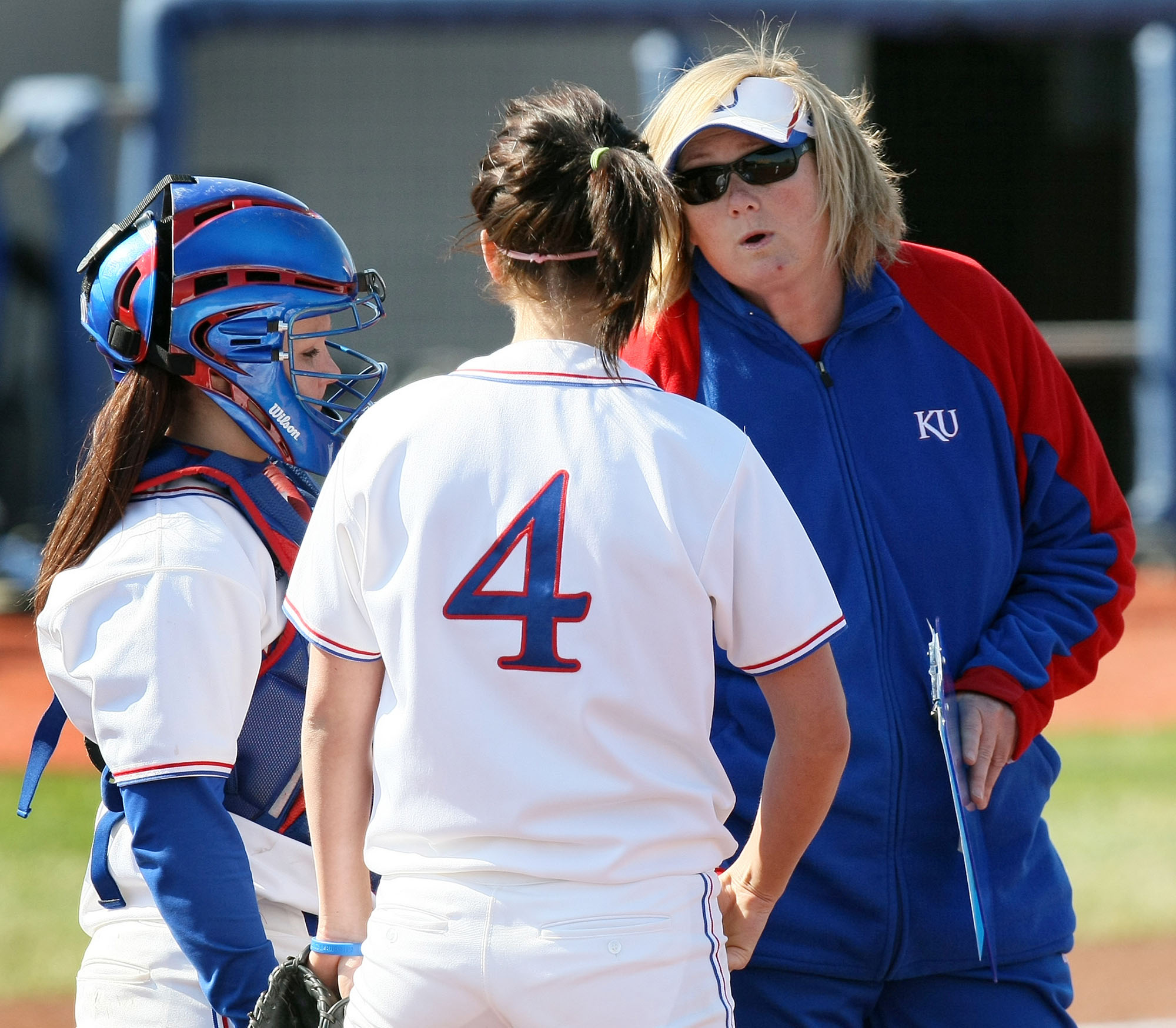
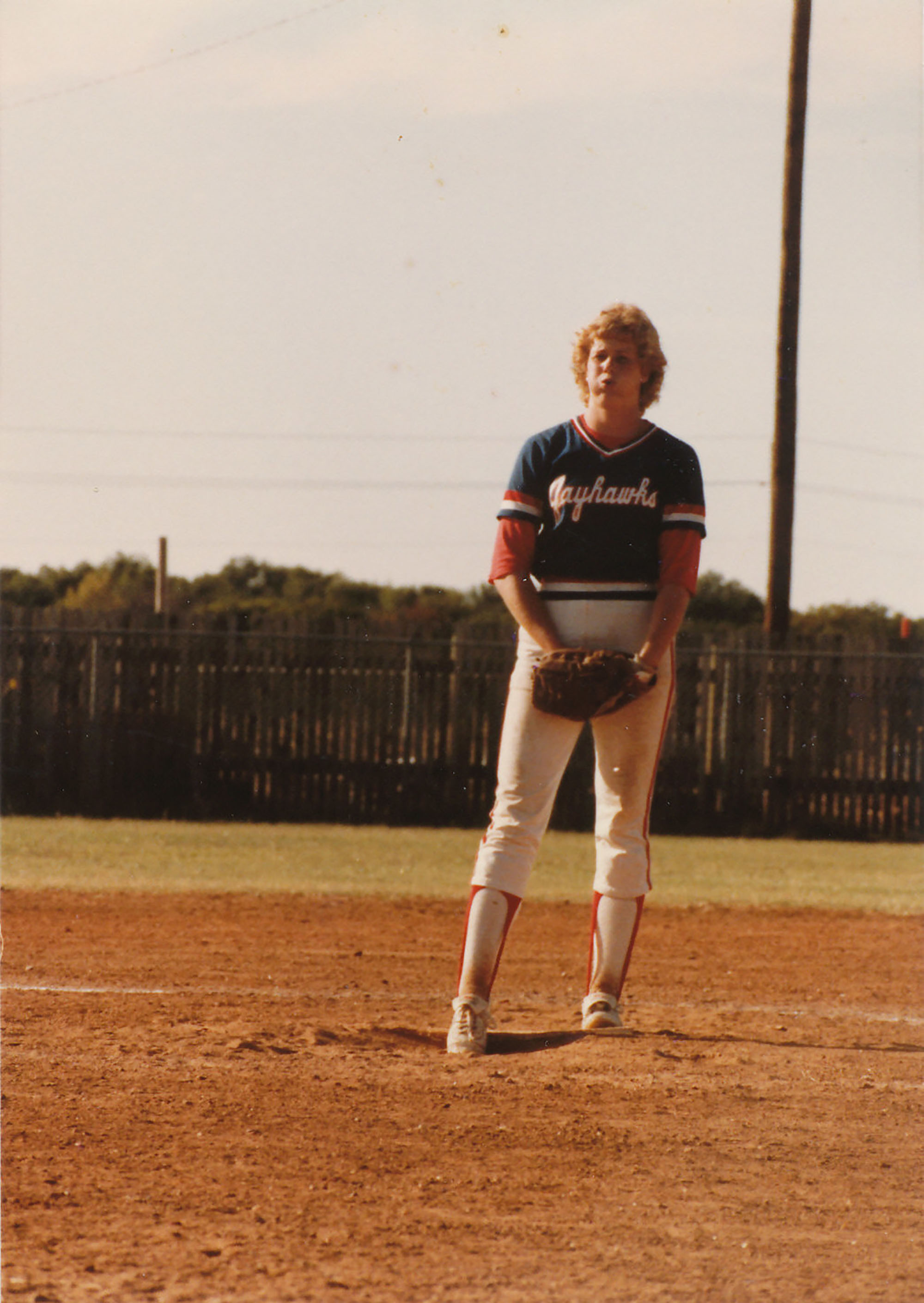
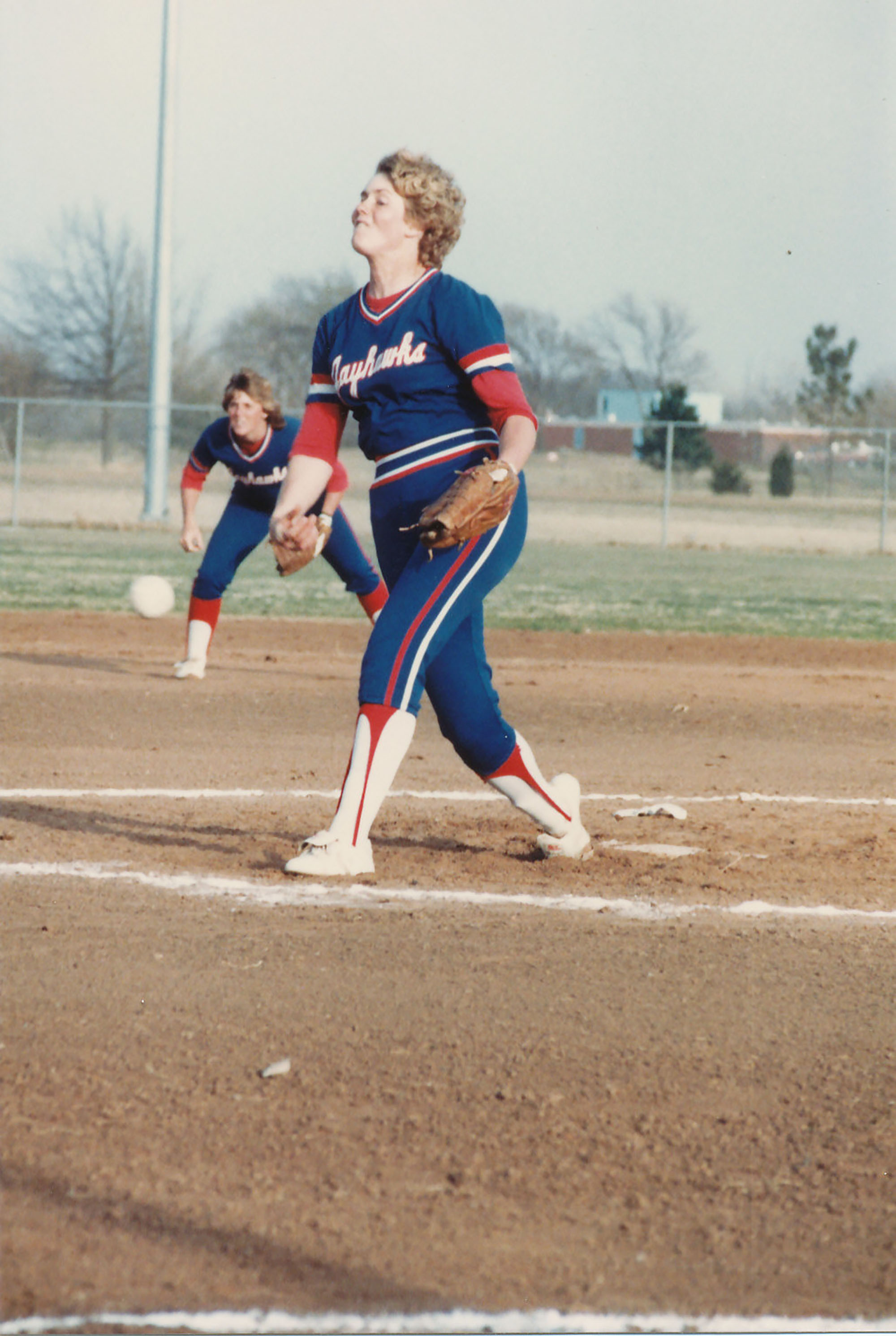
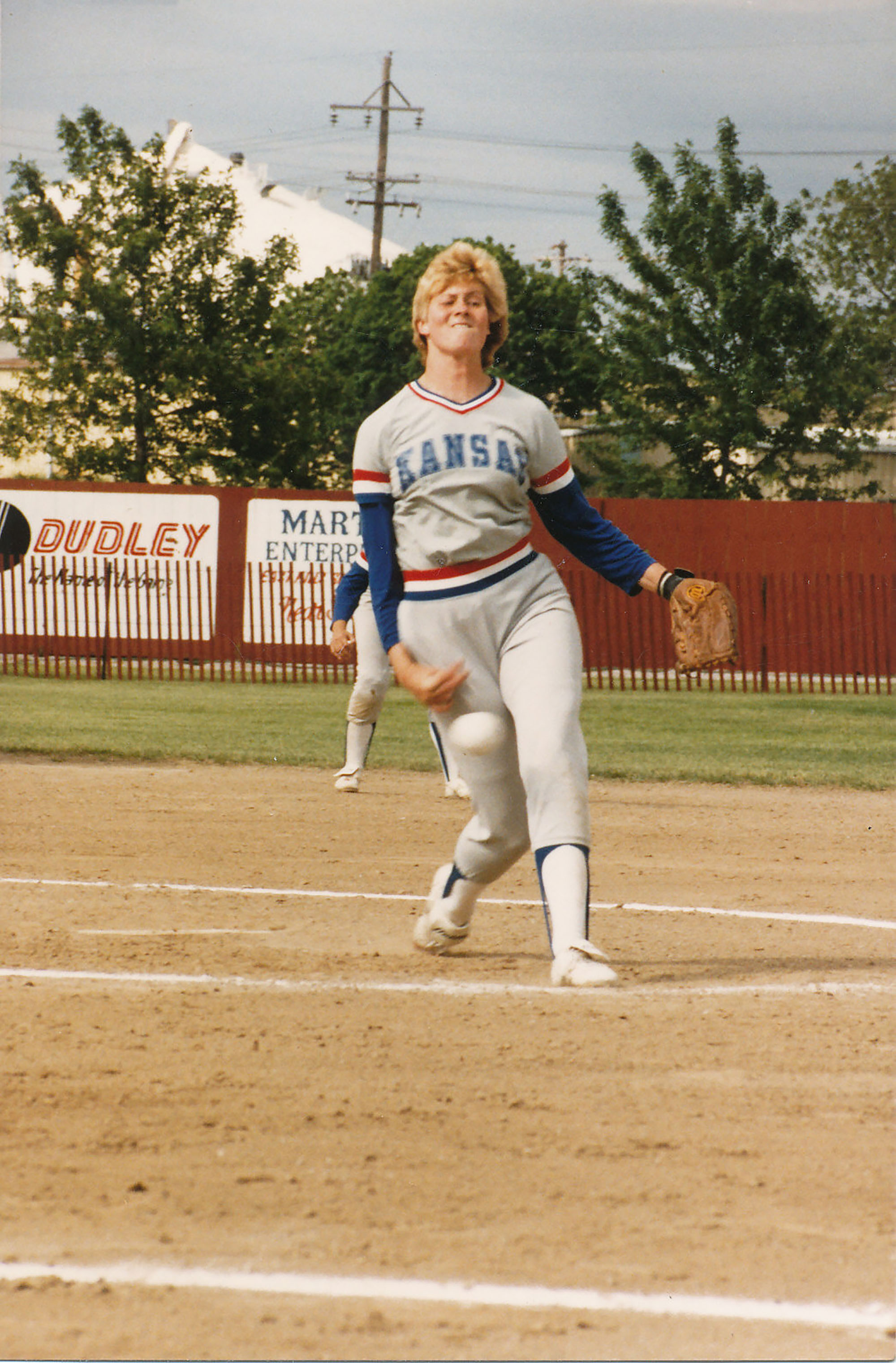
The Legend of Tracy Bunge
Kansas softball is set to retire the jersey of a legend. Tracy Bunge, a 1986 KU graduate, First Team All-American and Kansas Athletics women’s sports icon, will further cement her Crimson and Blue legacy this Saturday, April 7, by becoming the fourth softball player to have her jersey retired. Bunge, 54, has already been inducted to both the KU Athletics Hall of Fame and the Kansas Sports Hall of Fame and has explored nearly every corner of the game, both as a player (1983-86) and coach (1987-2009).
While Bunge’s playing days are well gone, the memories, relationships, multiple records, trophies and photos remain. When looking at photos of Bunge pitching, it isn’t difficult to imagine what was going through batters’ minds, then standing just 40 feet from the pitching rubber. Snapshots of Bunge’s remarkable playing career, mostly in black and white, capture her puffed cheeks, determined brow and flexed arm, hurling a blurred softball at the batter, a batter that more likely than not, whiffed. While action shots like these leave little question about Bunge’s intimidating mound presence or ability to rock 1980s hairstyles, they are greatly supplemented by thumbing through the Kansas record books.
As one of the most-decorated Kansas softball pitchers of all time, Bunge sits tied for first in career earned run average (ERA) (0.68) and alone as Kansas’ single-season ERA record holder, boasting an exemplary single-season ERA of 0.55. Bunge was selected as a member of the All-Big Eight Conference Team following her sophomore through senior seasons, earned NCAA All-Region First Team honors three times and was selected as an NCAA First-Team All-American in her senior season, 1986. Bunge practically owns the Kansas softball record books. She is second in career shutouts (44), third in career victories (78) and second in career runs scored (123). In addition, Bunge’s jaw-dropping ERA and individual dominance helped her Jayhawk teams to three NCAA Regional appearances.
When the day comes and Bunge’s jersey is immortalized at Arrocha Ballpark at Rock Chalk Park, she will be the first to credit her teammates and coaches from the “good-old days.” In a sport where individual statistics shine and a sole pitcher’s performance can dominate a game, or entire season, Bunge recognizes those who were always there to back up their ace.
“When I look at that kind of award, I know it’s a team award in a way,” Bunge said. “I had a great coach and great teammates and all of that led to my success as an individual. I couldn’t have done it without them.”
Filing through her extensive softball memories and life’s work, Bunge narrowed in on a run at the Big Eight Championship and playing in big-time games in the NCAA Tournament as the major highlights from her playing career. While any athlete strives to compete and win at their game’s highest level and on the greatest stage, Bunge most fondly reflects on the relationships she created with teammates and coaches in years of playing and coaching the game she loves.
During Bunge’s senior season in 1986, a tearful conversation with her pitching coach, Gary Hines, proved the power of these relationships, forged by the game. Kansas’ All-American pitcher was approaching one of life’s crossroads: graduation. For Bunge, 1986 graduation meant the end of four incredible years, the finish of a magnificent Kansas softball career, teammates moving across the country, leaving the university and town she learned to love and earning a business degree, a degree she had no interest in using. Bunge approached Hines with concerns about what was to come next in her life. She talked about her degree and what her parents may have wanted, while he talked about softball and what she wanted.
“It was one of the biggest conversations I ever had with a coach,” Bunge said. “He asked me what I wanted to do, and I said that I think I wanted to coach, and that was the start of everything. A heart-to-heart with my pitching coach at the time was instrumental to me looking inside my heart and determining what I wanted to do with my life.”
Bunge coached. Hines helped his former star transition immediately to the world of coaching, connecting her to an assistant coaching position at Iowa State in 1987. Much like her playing career, Bunge found quick success in coaching and did not slow down. The game that had given her so much, would now be graced by her knowledge, leadership and passion for years to come.
The former Jayhawk departed the Cyclones after five years, with four top-five Big Eight finishes and one NCAA Regional appearance. Bunge then helped lead Yale to an Ivy League Championship in 1993 as an assistant, before accepting her first head coaching position with the University of Ohio in 1994. In three seasons with Ohio, Bunge won a Mid-American Conference (MAC) Championship, made an NCAA Regional appearance and was named MAC Coach of the Year in 1995. The same year Bunge won coach of the year, came the end of her nine-year career playing softball in the Amateur Softball Association of America (ASA, now USA Softball), which included a National Championship in 1994.
Not long after her debut as a head coach and the end of her ASA stint, Bunge found herself right where she started, in Kansas. As Kansas softball’s head coach from 1997 to 2009, Bunge led her alma mater to four NCAA Regionals, one Super Regional and a Big 12 Championship in 2006.
Some of Bunge’s coaching career’s greatest memories and successes came while at the helm of the Jayhawks. Much like her playing career, Bunge credits elements of her success to her peers and mentors.
“I think as a player, you take bits and pieces from every coach you have ever been exposed to, like, ‘I can do it that way,’ or ‘That was successful and I like that,'” Bunge said.
Bunge learned from a network of her own former coaches, including her coach at Kansas, Bob Stanclift, who will be in attendance for Bunge’s jersey retirement Saturday.
After over two decades of earned success in college softball, both as a player and coach, Bunge elected to pursue another avenue in which to celebrate the game she has committed most of her life to. Following her head coaching career at Kansas, Bunge was provided arguably the most unique opportunity of her career, a position coaching the Dutch National Team.
“Shortly after I left KU, a friend was on the board of the International Softball Association at the time, and she told me there was an opportunity in Holland,” Bunge said. “Four days later, I was on a plane.”
Bunge, an All-American, Coach of the Year, Ivy League, MAC and Big 12 Champion, was now the pitching coach for the Dutch National Softball Team. Bunge is frequently asked if she is Dutch, where she simply replies, “No.” This may be a response in place of a longer answer about how softball has created opportunities across the world and back for Bunge, or something about her knowledge and love of the game being sought out by coaches, organizations and players alike to grow the sport around the world and develop talent.
Bunge went on to lead the Dutch National Team as an assistant for five years and as a head coach for one. During this time, Bunge added countless stamps to her passport, as well as three World Championship appearances and a European Championship to her expansive softball resume in 2011. Once back stateside, Bunge coached briefly in the National Pro Fastpitch league, for the Pennsylvania Rebellion.
It was a fateful conversation with then-Jayhawk assistant coach, Gary Hines, in 1986 that vaulted Bunge into this extensive run in coaching of more than two decades and the rest of her life with softball. Bunge recalls this transitional period in her life with great pride, remembering the guts it took to pursue her passion, in spite of little pay and questions of what’s to come for her favorite game beyond college.
Bunge’s wide range of success in both playing and coaching softball can be attributed to many things: great coaching, support from her friends and family, her athletic gifts and hours of hard work. However, Bunge’s impressive career may be best attributed to perfect timing.
In 1983, when Bunge started her playing career at the University of Kansas as a freshman, the National Collegiate Athletic Association (NCAA) was in its first year sponsoring college softball. The soon-to-be Jayhawk star and the game of softball shared an NCAA debut season, providing the Bartlesville, Oklahoma, native a unique opportunity to grow in the sport she loved during a critical time in shaping the future of college softball.
“It’s an honor to be a part of that history, but there wasn’t a lot for women’s sports at the time. Money was tight, we didn’t play on campus, there was no field on campus, so we played at Holcomb Park,” Bunge said.
Bunge recalled long drives to away games, in which the coaches drove the entire team, packed in only two vans, because that was all the budget would allow. Crammed hotel rooms, not-so-great eating habits, limited equipment and coaches doubling as grounds crew members rounded out some of the challenges of early NCAA softball, as she remembered.
Little by little, things changed for Bunge and Kansas softball. The players received more gear from the athletics department and eventually were outfitted by a Kansas sportswear contract. Facilities slowly improved thanks to Allen Fieldhouse bleacher donations and a move to a space on campus.
“The things we got from the athletics department were treasured items; the sweatshirts, sweatpants, practice gear. We were so appreciative because women didn’t get very much back in the day, so what you did get, you were very appreciative of,” Bunge said.
On the forefront of Kansas softball’s developmental years, as both a player and coach, Bunge watched her game change, while at the same time, developing as a player. While Bunge soaked up coaching knowledge and continuously worked to drop her ERA, college softball was beginning to provide opportunities for young women, the equipment was improving and the sport was generating more and more support.
Listening to Bunge recount her experience as one of the most-influential female athletes in KU history, she is proud of how far women’s athletics and the game of softball have come.
“It’s been really exciting to watch the growth of the sport over the last 30-to-40 years and to be a part of that in some way,” Bunge said. “It’s just exciting to see the support that is now in place for women’s athletics. We still aren’t on equal footing in some ways, but it sure has come a long way.”
A long way is right. Today, Bunge is continuing to deepen her connection with softball by fostering more of the relationships, forged by the sport, to which she credits much of her success and her most memorable moments. The legendary player, turned instructor, is now coaching private lessons in Lawrence for players between the ages of 10 and 18 years old. To supplement her small-scale, individual coaching efforts, Bunge is currently set to travel to Europe this fall to coach at the European Softball Association’s developmental clinic. In her international endeavors, Bunge describes her role as two-fold, to help develop players around the world, as well as coaches.
On Saturday, April 7, 2018, when Bunge’s jersey is retired at Arrocha Ballpark at Rock Chalk Park, two seats will be occupied by Bunge’s greatest supporters, her parents, Barbara and Al Bunge.
“My parents sacrificed a lot to put me and my sister through the sporting programs that we did, plus the emotional support and everything that goes into it. You know, my parents were with me every step of the way,” Bunge said.
Many in attendance Saturday will leave their seats, giving Bunge a standing ovation, and she will likely wave to the crowd with a hand that has left its print on the game in so many areas. A hand that seemingly grasped the hand of the game of softball, for a walk through life, from Bartlesville, Oklahoma, to Lawrence, Kansas, across the world and back.
At some points, Bunge led, showing softball a brilliant mind and exceptional ability. She developed some of the game’s best talents and paved the way for young women preparing for a college degree, a championship game or a lifelong opportunity.
When softball led, Bunge was provided a career, the triumphant joy of a win or sinking feeling of a crushing defeat. Softball has taken Bunge around the world, to some of the game’s biggest stages. It has also taken her to a knee, eye-to-eye with the game’s youth, in individual lessons.
Tracy Bunge’s personal journey with softball will one day come to a close. What will endure is her massive reach; how she touched of the lives of so many in softball, the relationships she has fostered throughout the years, the young women she has inspired, many of the records she has broken and of course, her Kansas softball jersey.
Once a Jayhawk, Always a Jayhawk.


